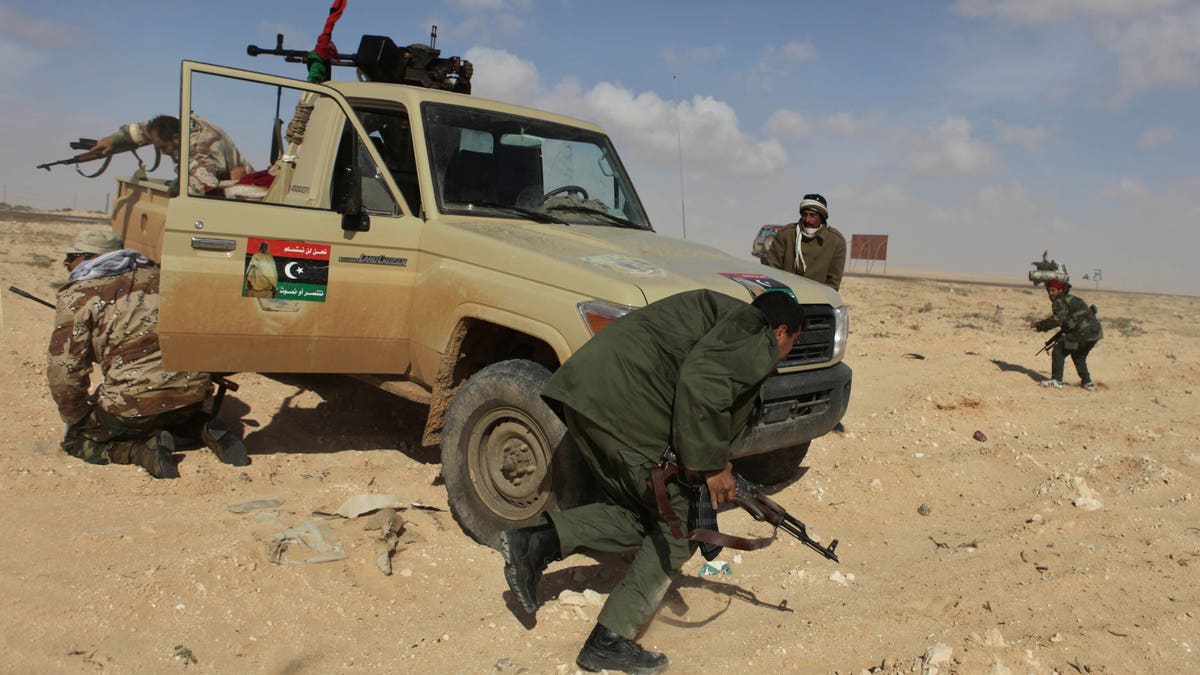
Libyan rebels run for cover after coming under heavy artillery fire from pro-Qaddafi forces along the front line near Brega, Libya, Friday, April 1, 2011. Libya's rebels will agree to a cease-fire if Muammar al-Qaddafi pulls his military forces out of cities and allows peaceful protests against his regime, an opposition leader said Friday as rebels showed signs that their front-line organization is improving (AP2011)
AJDABIYA, Libya – NATO said Saturday that it was investigating Libyan rebel reports that a coalition warplane had struck a rebel position that was firing into the air near the front line of the battle with Muammar al-Qaddafi's forces.
Rebel fighters told Reuters that at least 10 were killed at the scene. One rebel fighter said some of Qaddafi's forces sneaked into rebel lines and fired anti-aircraft guns in the air to provoke the attack. Others said some rebels fired into the air by accident.
The reports could not be immediately confirmed.
Rebels told The Associated Press that the airstrike happened about 12 miles east of the town of Brega late Friday.
Mohammad Bedrise, a doctor in a nearby hospital, said three burned bodies had been brought in by men who said they had been hit after firing a heavy machine gun in the air in celebration. Idris Kadiki, a 38-year-old mechanical engineer, said he had seen an ambulance and three cars burning after an airstrike.
NATO spokeswoman Oana Lungescu said the coalition was looking into the reports.
The loosely organized rebel force had been acting in a more disciplined fashion in recent days. On Friday only former military officers and the lightly trained volunteers serving under them were allowed on the front lines. Some were recent arrivals, hoping to rally against forces loyal to the Libyan leader who have pushed rebels back about 100 miles this week.
The better organized fighters, unlike some of their predecessors, can tell the difference between incoming and outgoing fire. They know how to avoid sticking to the roads, a weakness in the untrained forces that Qaddafi's troops have exploited. And they know how to take orders.
The greater organization was a sign that military forces that split from the regime to join the rebellion were finally taking a greater role in the fight after weeks trying to organize. Fighters cheered Friday as one of their top commanders -- former Interior Minister Abdel-Fattah Younis -- drove by in a convoy toward the front.
It was too early to say if the improvements will tip the fight in the rebels' favor. They have been struggling to exploit the opportunity opened by international airstrikes hammering Qaddafi's forces since March 19.
In a sign the strikes may be eroding Qaddafi's resilience, his government is trying to hold talks with the U.S., Britain and France in hopes of ending the air campaign, said Abdul-Ati al-Obeidi, a former Libyan prime minister who has served as a Qaddafi envoy during the crisis. "We are trying to find a mutual solution," he told Britain's Channel 4 News on Friday.
British officials met with Mohammed Ismail, a Libyan government aide who happened to be in London visiting relatives, and told him Qaddafi must quit, two people familiar with the issue said Friday. The two demanded anonymity to discuss details.
The opposition said Friday in Benghazi, its de facto capital, that it will agree to a cease-fire if Qaddafi pulls his military forces out of cities and allows peaceful protests against his regime.
The rebel condition is that "the Qaddafi brigades and forces withdraw from inside and outside Libyan cities to give freedom to the Libyan people to choose," said Mustafa Abdul-Jalil, head of the opposition's interim governing council. "The world will see that they will choose freedom."
Qaddafi's forces continue to attack rebels in the east, which is largely controlled by the opposition, and have besieged the only major rebel-held city in the west, Misrata.
Misrata has been shelled by tanks and artillery for days, said a doctor in a city hospital who spoke on condition of anonymity out of fear of reprisals. Many people have been killed, including eight since Thursday, he said. He said Qaddafi brigades control the port and a main street, but rebels control the heart of the city.
The Associated Press contributed to this report.
